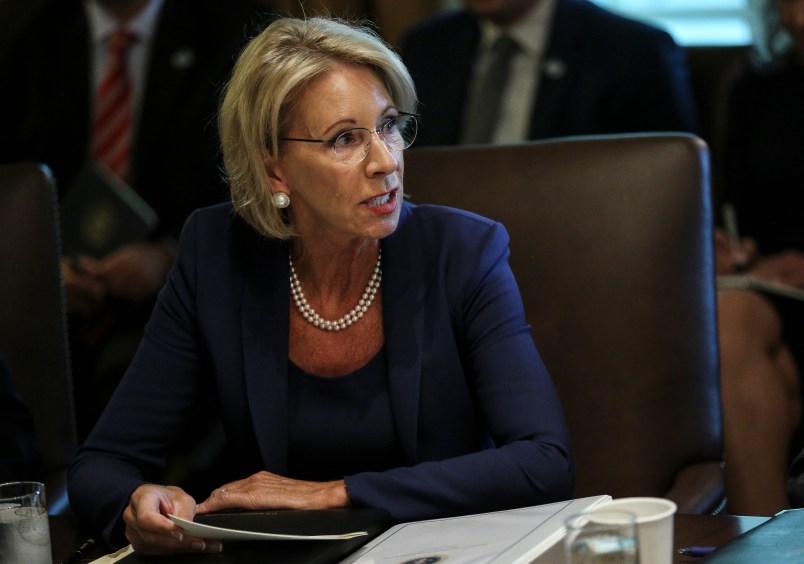WASHINGTON (AP) — Education Secretary Betsy DeVos said Tuesday that ballooning student debt has caused a “crisis in higher education,” and that the traditional path to college might not be the best choice for all students.
DeVos made the comments in Atlanta at a training conference for the Education Department’s Federal Student Aid division, which oversees student loans awarded by the federal government. The department released a text of her remarks.
“Our higher-ed system is the envy of the world, but if we as a country do not make important policy changes in the way we distribute, administer and manage federal student loans, the program on which so many students rely will be in serious jeopardy,” she said.
DeVos said the federal government holds $1.5 trillion in outstanding student loans, a threefold increase from 2007 and a $500 billion increase from 2013. She said Federal Student Aid’s loan portfolio now accounts for nearly 10 percent of America’s national debt.
She blamed the Obama administration and its 2010 takeover of federal student loans, which stopped private banks from giving out federally subsidized student loans. DeVos says the decision encouraged colleges to hike their tuition rates.
“When the federal government loans more taxpayer money, schools raise their rates,” she said. “FSA financing accounts for 80 percent of the actual tuition and fee revenue received by schools.”
She said most of the loan growth since 2010 is tied to individuals taking on more debt, rather than a growing number of students taking out loans. She said 70 percent of the growth is tied to increases in individual debt, while 30 percent is driven by growing numbers of borrowers.
As a result, she said, many students are struggling to pay off their debt, with 43 percent of all loans considered “in distress” by the federal government.
“The parade of programs, repayment options and complex rules serves no one well,” she said. “Everything has become more cumbersome and confusing for everyone. The government monopoly has proven costly to taxpayers and it hasn’t been a panacea for students either.”
DeVos didn’t propose specific changes but laid out “core principles” that she said must guide changes to the student loan system. Chief among them is an emphasis on helping students find “the education that’s right for them,” even if it isn’t a traditional four-year university.
She also pushed for greater innovation in education, and better information to guide families and policymakers.
DeVos said the federal government must become a “more responsible” lender, but also said schools and families should bear greater responsibility as the nation tackles its student debt woes.
“Students — our human capital — must equip themselves to be responsible consumers of education with a serious commitment to their own success,” she said. “They need to have the best possible tools, data, advice, and support. And then they need to understand the implications of their decisions.”







Honestly, Betsy can’t go fuck herself hard enough or fast enough.
Starting in January, the Congress is going to do plenty of it. She’ll be resigned by March.
Gadz, I hope so!
DeVos again shows her lack of education. The “takeover” was not a “takeover” - it was just getting rid of the middleman and so saved the federal government money. Universities knew which loans were government guaranteed before 2010 and nothing changed after 2010, except that the banks no longer got a cut for “originating” the loan before passing it off to the government.
Schools have be raising rates though. I can confirm as I have two in college right now and have had at least one in since 2012. On campus housing and food are ridiculously high.